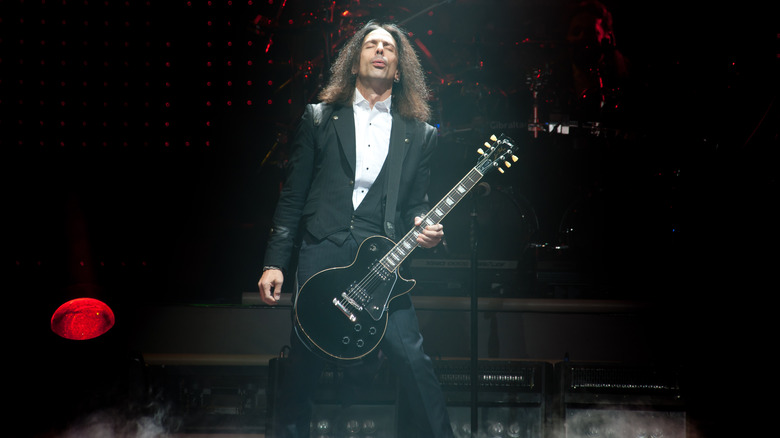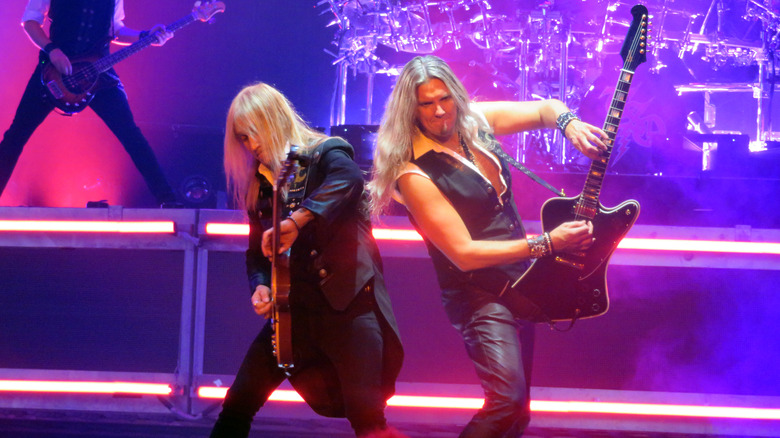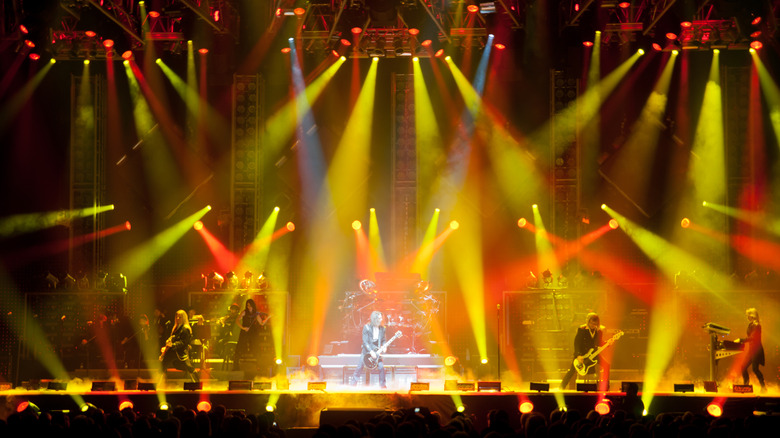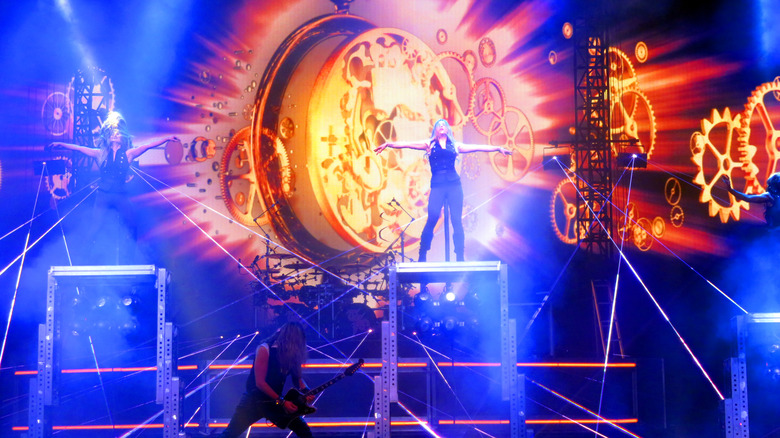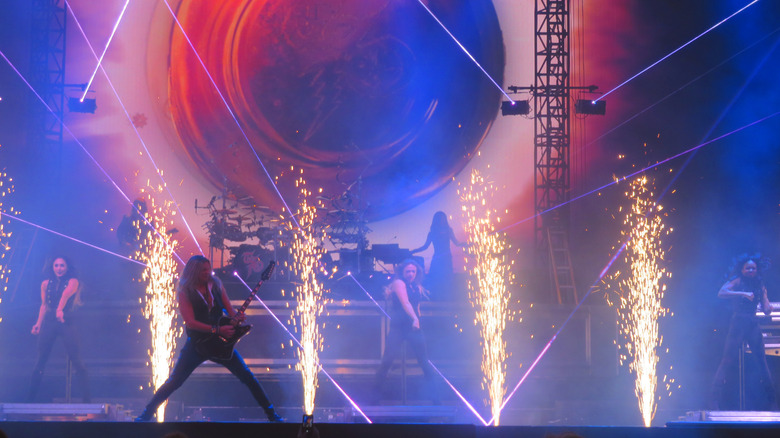The Untold Truth Of Trans-Siberian Orchestra
Every year at this time, Christmas music begins to fill the air. Your favorite radio station may have switched to an all-holiday format by now, and your days are now filled with the holiday stylings of Mariah Carey, Bing Crosby and the like. However, for the past 25 years or so you may have noticed that a song that seems ever so slightly out of place will come up from time to time in the rotation. Rather than being a joyful ode to Santa or family or presents, the song is a mournful dirge filled with melodies taken from classical and heavy metal motifs. Further, the song has no lyrics, and its title, "Christmas Eve Sarajevo," reveals that it's about a European city ravaged by war.
The song is the biggest and most well-known work by Trans-Siberian Orchestra, a band founded in 1996. If you've heard their name at all, you associate only with that single song. As it turns out, however, the group has an entire oeuvre of holiday songs, and listening to them on the radio doesn't do it justice, in particular since some of them were meant to be heard in sequence and in the context of other songs. To fully get the Trans-Siberian experience, you have to see them live and on-stage.
Bringing back prog rock
It's a genre that has been all but forgotten about by now, but for a time a few decades ago, there was no escaping Progressive Rock (or Prog Rock). Bands like Kansas, ELO, and Yes, among others, sought to elevate rock & roll from its radio-friendly basic structure and turn it into a serious art form. Specifically, the genre combines complicated melodic structures (sometimes pulled from classical music) with arcane lyrics, oftentimes drawing on mythology. Much of prog rock is intended to tell a story; when played from beginning to end, a band's album might be a singular narrative. The concept is sometimes called a rock opera.
Trans-Siberian Orchestra founder Paul O'Neill is clear, on the band's website, that he was, from the beginning, all about bringing back prog rock. "The whole idea was to create a progressive rock band that would push the boundaries (of the genre) further than any group before ... Way, way further," he said.
Christmas Eve Sarajevo goes big
After getting funding and support from a label, according to the band's website, O'Neill got to working on his first project, a rock opera about Christmas. As it turns out, one of the songs from that album not only hit it big, but to this day it is the song most associated with the band: "Christmas Eve Sarajevo." The song, which combines soft cello bits playing classical Christmas melodies with thundering heavy metal, serves as a sort of audio representation of the horrors of war.
That was its intention, O'Neill told Christianity Today. Specifically, he said, the song was about a cello player who returned to Sarajevo during the worst of the Balkan War to find his city being shelled into oblivion by his own neighbors. "Rather than head for the bomb shelters like his family and neighbors, this man went to the town square, climbed onto a pile of rubble that had once been the fountain, took out his cello, and played Mozart and Beethoven as the city was bombed," O'Neill said.
A fusing of disparate styles
If you were to illustrate Trans Siberian Orchestra's music on a Venn Diagram, you would find them at the intersection where classical, Christmas, and heavy metal styles all meet, with a little bit of British Isles folk music and some Broadway thrown in. As O'Neill explained to Christianity Today, "having grandparents from Ireland, the storytelling elements of Celtic music had a great impact on me ... I have [also] always been fascinated by the discipline of Broadway performers who were untapped by the rock world. So we tapped them and rocked them up," he said.
Similarly, in a 2010 interview with Lumino magazine, the band's founder referenced Mozart and Beethoven as influences. "Mozart and Beethoven are my favorite composers. They still blow me away," he said, noting that the album "Night Castle" and the accompanying tour were both based on Beethoven's death. "Beethoven had a hard life. If he would have crawled in a corner and given up, nobody would have said anything. But he didn't. The show is about how one person can change the course of history," O'Neill added.
You really need to see them on stage
Although Trans Siberian Orchestra produces albums that you can download or purchase at your favorite music store, by some measures the band was always intended to be experienced live rather than recorded. They effectively went from not existing to selling out 10,000-seat arenas without ever having toured in smaller clubs or worked as an opening act, Lumino notes. And once you're inside one of those sold-out arenas, expect a mind-blowing show, said O'Neill (via Christianity Today).
"A newspaper once described us as 'Phantom of the Opera' meets The Who with Pink Floyd's light show," he said. They began touring in 1999. On stage, the story that the band is trying to tell is further fleshed out with the help of a narrator who ties everything together. Meanwhile, behind him is a full orchestra, a full rock band, 10 singers, and multiple elaborate lighting, screen, and pyrotechnic effects. So intense are the fire effects, wrote a reviewer for CleveRock, that he could feel the heat, and he assumed the performers on the stage had to learn where to stand to avoid being incinerated.
The band supports local charities wherever they go
Trans-Siberian Orchestra, like just about every other rock band big or small, tours from city to city. And in each city they perform, as Dayton notes, the band donates at least $1 or more from every ticket sold to a local charity. By 2021, the band had donated $16 million to various charitable causes.
In some cases, those contributions are extremely specific. For example, as the Times Union notes, when the band swung through Albany, New York, in 2013, they brightened a young fan's day. Specifically, a local lad named J.J., who plays rock guitar and who suffers from Tourette's Syndrome, got a signed, $1,500 guitar as a gift from the band. "A little gift for you. Enjoy the guitar and keep on Rockin'!," O'Neill wrote on a handwritten note to J.J., who is so relentlessly taunted by his peers for his vocal tics that he's home-schooled. The band also included sheet music and a signed photo for J.J.
Tragically, O'Neill died in 2017 from an accidental drug overdose after battling a chronic medical condition, as Rolling Stone reports. He was 61 years old.

